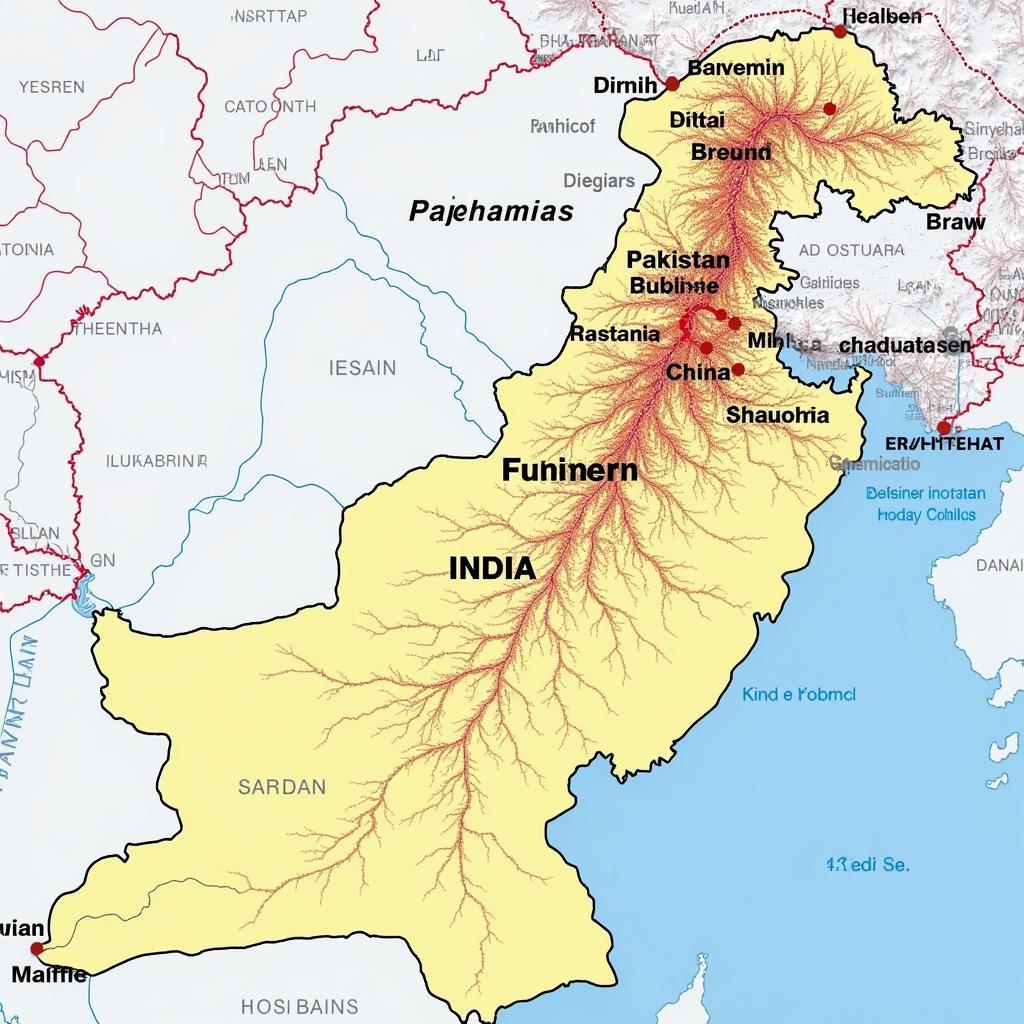Pakistan’s geostrategic importance has captivated global attention for decades. Its unique location at the crossroads of South Asia, Central Asia, and the Middle East makes it a pivotal player in regional and international affairs. This analysis delves into the multifaceted dimensions of Pakistan’s geostrategic significance, exploring its impact on global politics, economics, and security.
Pakistan’s Geographical Location: A Strategic Crossroads
Pakistan’s geographical location is the cornerstone of its geostrategic importance. Bordering Afghanistan, Iran, India, and China, it serves as a bridge between several key regions. This location provides Pakistan with significant leverage in international relations.  Pakistan's Geopolitical Map This unique positioning has historically made Pakistan a crucial partner for both regional and global powers. For instance, its proximity to the Strait of Hormuz, a vital chokepoint for global oil supplies, further amplifies its strategic relevance. Furthermore, Pakistan’s long border with Afghanistan has played a significant role in regional security dynamics.
Pakistan's Geopolitical Map This unique positioning has historically made Pakistan a crucial partner for both regional and global powers. For instance, its proximity to the Strait of Hormuz, a vital chokepoint for global oil supplies, further amplifies its strategic relevance. Furthermore, Pakistan’s long border with Afghanistan has played a significant role in regional security dynamics.
Economic and Trade Significance
Pakistan’s geostrategic location offers significant economic and trade advantages. The country serves as a natural transit route for goods flowing between Asia and beyond. The China-Pakistan Economic Corridor (CPEC), a flagship project of the Belt and Road Initiative, exemplifies the potential for economic development driven by Pakistan’s strategic position. geostrategic importance of pakistan CPEC aims to connect Gwadar Port on the Arabian Sea with Xinjiang in China, opening up new avenues for trade and investment.
The China-Pakistan Economic Corridor (CPEC): A Game Changer?
CPEC has been hailed as a game changer for Pakistan’s economy, promising significant infrastructure development and job creation. However, it has also faced criticism regarding its potential impact on Pakistan’s debt burden and sovereignty. Regardless of these concerns, CPEC underscores the growing recognition of Pakistan’s geostrategic value in the global economic landscape.
Security and Defense Implications
Pakistan’s geostrategic location also presents significant security challenges. Its proximity to regions experiencing conflict and instability requires a robust defense posture. strategic importance of pakistan Pakistan’s nuclear arsenal, developed in response to regional security threats, further adds to its geostrategic complexity. Maintaining a balance between national security interests and regional stability remains a key challenge for Pakistani policymakers.
Combating Terrorism and Extremism
Pakistan has been at the forefront of the fight against terrorism and extremism. Its efforts to combat these threats have significant implications for regional and international security. The country’s cooperation with international partners in counterterrorism operations highlights its commitment to maintaining regional stability.
Natural Resources and Energy Security
Pakistan possesses a diverse range of natural resources, including coal, natural gas, and hydropower potential. These resources, coupled with its strategic location, contribute to its energy security outlook. natural resources of pakistan pdf Developing and utilizing these resources effectively is crucial for Pakistan’s economic growth and stability. groundwater recharge in pakistan
“Pakistan’s geographical position makes it a critical player in regional stability,” states Dr. Ayesha Khan, a prominent geopolitical analyst based in Islamabad. “Its ability to navigate complex relationships with neighboring countries is essential for maintaining peace and security.”
Foreign Policy and International Relations
Pakistan’s foreign policy reflects its complex geostrategic environment. Maintaining balanced relationships with major global powers, including the United States, China, and Russia, is a key priority. foreign policy of pakistan by abdul sattar pdf Navigating these relationships effectively requires a nuanced approach that safeguards Pakistan’s national interests while promoting regional cooperation.
“Pakistan’s foreign policy must prioritize regional cooperation and economic development,” argues Mr. Imran Ali, a seasoned diplomat and former ambassador. “Leveraging its geostrategic advantages can unlock significant opportunities for growth and prosperity.”
In conclusion, the geostrategic importance of Pakistan remains undeniable. Its location, economic potential, and security challenges all contribute to its pivotal role in regional and global affairs. By effectively managing its complex geopolitical landscape, Pakistan can unlock its full potential and contribute to a more stable and prosperous future.
FAQ
- What is the significance of CPEC for Pakistan?
- How does Pakistan’s location impact its foreign policy?
- What are the main security challenges facing Pakistan?
- What role does Pakistan play in regional counterterrorism efforts?
- How can Pakistan leverage its geostrategic advantages for economic development?
- What are the key natural resources found in Pakistan?
- How does Pakistan maintain a balance in its relations with major global powers?
When you need assistance, please contact Phone Number: +923337849799, Email: news.pakit@gmail.com Or visit us at: Dera Ghazi Khan Rd, Rakhni, Barkhan, Balochistan, Pakistan. We have a 24/7 customer care team.